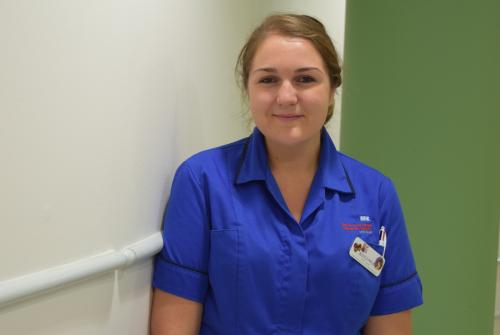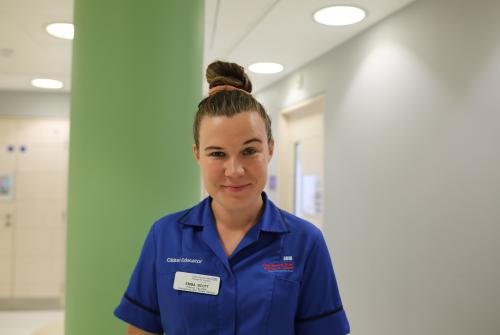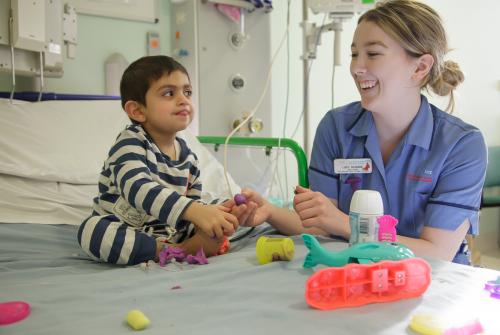Learning and development

Great Ormond Street Hospital (GOSH) has the largest paediatric nurse education programme in Europe, offering you extensive education opportunities and the chance to build an extraordinary career. We offer unique cultural training opportunities and the chance to work within a truly international team.
We are committed to supporting the ambition and career development of our nurses and in collaboration with London Southbank University (LSBU), provide a range of opportunities for continuing education and career development as a postgraduate nurse. Whether you have just started your nursing career or are looking for a new challenge, we are here to support you!
You don’t need paediatric experience to work with us; we welcome nurses from all clinical backgrounds. Our friendly and dedicated Practice Development Team will ensure you get the training and support you need.
After completing your GOSH trust induction, you will complete a local induction to the international directorate. This will include meeting members of the management team, learning about the future and growth of IPP, learning about working with international families and meeting other members of the multi-disciplinary team. We also cover Trust mandatory sessions, and provide practical and theoretical sessions to provide you with the skills and knowledge you need to care for your patients.
Once starting on the ward your local education team, along with staff on the ward, will support you to achieve your competencies in administration on non-intravenous and intravenous medications, central line dressings and care, blood sampling from central lines, administration of total parenteral nutrition, accessing port-a-caths, and administration of blood products.
Depending on your ward area, additional training and competencies for nurses working within IPP includes chemotherapy, External Ventricular Drainage (EVD), Glomerular Filtration Rate (GFR), advanced Central Venous Access Device (CVAD) skills, tracheostomy care, non invasive ventilation, venepuncture and cannulation.
We encourage all of our nursing staff to complete Practice Supervisor and Practice Assessor training to equip them with the skills to be able to support, teach and assess student nurses, HCAs and junior staff. This is in line with the NMC Standards for Student Supervision and Assessment.
Some staff undertake a link role which allows acquisition of further skills and knowledge in several areas e.g. infection control.
Staff are encouraged to attend study days and courses and share learning with their colleagues.
Newly-registered nurses at GOSH benefit from a unique, three-year education pathway, approved by Health Education England (HEE), that is specifically designed to support their continued clinical development and enhance their workplace wellbeing.
Preceptorship and band 5 development programme
At GOSH, all our newly-registered nurses go through a three-year programme. This includes a 12-month Preceptorship which includes a bespoke orientation week, Trust and ward inductions, a two-week supernumerary period (more on ITU), ward experience, an identified preceptor, IV study days, Conflict Resolution Training, BLS+ training and a 4-day Professional Development Programme.
The second year of the programme is the Band 5 Development Programme - this is focused around Trust projects and a local foundation course in their particular specialty. The band 5 development programme is designed to help kick start the revalidation process for NMC and ensure our newly registered nurses are well supported.
In their third year, our newly-registered nurses are given the opportunity to undertake an academic module to ensure continued development, as well as undertake the year 3 stepping up development days as part of their graduate programme.
Our extensive newly-registered nurse education programme is designed to:
- Build confidence and provide a robust peer support network
- Enhance professional career development through clinical and non-clinical skill development
- Provide a springboard for revalidation
- Provide a regular check in opportunity with neutral but knowledgeable facilitators
- Support and develop their wellbeing, resilience and emotional intelligence
Home groups
During the preceptorship programme our newly-registered nurses will have access to home groups. These small groups are set up to provide a safe space for our nurses to reflect on what they’ve learnt and provide a neutral and safe atmosphere to discuss challenges and celebrate achievements. The home groups uphold the HEE Preceptorship standards and provide a regular peer support network.
A dedicated team of practice facilitators
Our nurses are supported by a dedicated team of newly-registered nurse practice facilitators. The team are on hand to provide professional support, facilitate learning opportunities and help our nurses develop into confident and competent children’s nurses.
General rotation programme
As well as joining as a staff nurse, GOSH offers newly registered-nurses the opportunity to take part in a general rotation programme which runs over two years and consists of 1 x 1 year and 2 x 6-month ward experiences.
Participants are supported and overseen by the newly registered nurse practice facilitator team, who that rotation nurses reach their potential in all the ward areas they work on. This means they have a go-to person each time they move wards. The aim of the programme is to enable our nurses to:
- Gain experience and confidence in a supportive environment
- Gain experience in a variety of clinical settings
- Develop their leadership and management style
- Develop a portfolio of transferable skills
Development programmes
These programmes are designed for all different grades, for example Band 5 development or Band 6 development.
We also offer support to help you gain promotion within the organisation with ‘stepping up’ programmes, such as ‘stepping up to a six’ for those Band 5s who are thinking of their first promotion, as well as ‘stepping up to a seven’ and ‘stepping up to be a matron’.
Each development programme has the same themes of leadership, conflict resolution and resilience, and builds upon these themes as you progress through your career.
Academic Modules
GOSH is committed to supporting the ambition and career development of its nurses and in collaboration with London Southbank University (LSBU), provides a range of opportunities for continuing education and career development as a postgraduate nurse.
We offer a range of modules for experienced nurses.
Rotation programmes
The rotation programme is available to all staff members as an option if you would like to gain more experience in another area.
Rotation between specialities on an 8-monthly basis can help you maximise what GOSH has to offer and help you develop your skill set more widely. Teams of nurses in Nursing Workforce will be able to help you decide which combinations of practice areas are most appropriate for your experience and skill set.
All our nurses also benefit from a dedicated clinical simulation centre with various programmes to provide exposure, experience and clinical practice with a range of nursing skills and clinical scenarios.
Nurses at GOSH have access to a variety of programmes and academic pathways designed to enhance knowledge, skills and expertise. In collaboration with the ward teams we will develop a career development plan to ensure you gain all the skills needed to fulfil your potential.
This might be through academic modules to give you the evidence-based theory behind your nursing interventions and encourage you to become a questioning practitioner, clinical experience in a range of specialist areas to help you marry the theory and the practice aspect of nursing, or via one of our development programmes.
Academic Modules
GOSH is committed to supporting the ambition and career development of its nurses and in collaboration with London Southbank University (LSBU), provides a range of opportunities for continuing education and career development as a postgraduate nurse.
We offer a range of modules for experienced nurses.
Development programmes
These programmes are designed for all different grades.
We also offer support to help you gain promotion within the organisation with ‘stepping up’ programmes, such as ‘stepping up to be a matron’.
Each development programme has the same themes of leadership, conflict resolution and resilience, and builds upon these themes as you progress through your career.
Rotation programmes
The rotation programme is available to all staff members as an option if you would like to gain more experience in another area.
Rotation between specialities on an 8-monthly basis can help you maximise what GOSH has to offer and help you develop your skill set more widely. Teams of nurses in Nursing Workforce will be able to help you decide which combinations of practice areas are most appropriate for your experience and skill set.
All our nurses also benefit from a dedicated clinical simulation centre with various programmes to provide exposure, experience and clinical practice with a range of nursing skills and clinical scenarios.
GOSH is committed to supporting the ambition and career development of nurses and in collaboration with London Southbank University (LSBU), provides a range of opportunities for continuing education and career development as a postgraduate nurse. Learn more about our courses below.
Adult / Adolescent with Congenital Heart Disease
Overview
The aim of this module is to enhance the health care professional's existing understanding of the client group, developing an insight into the specific needs of patients with congenital heart disease as they progress from childhood to adult life. It is designed to meet the needs of two groups of health care professionals: paediatric staff who are preparing children for their transition to adult health care services, and those meeting the needs of those who are already adults.
This module is delivered by clinical colleagues across Great Ormond Street Hospital and Barts Health NHS Trust. Teaching is delivered across sites.
Advanced Clinical Skills in Paediatric Ventilator Management
Overview
Through systematic assessment of the mechanically ventilated child, and the application of essential physiology to the assessment, the nurse will develop informed decision-making skills regarding the therapeutic management of respiratory support, the weaning of mechanical ventilation and the possible extubation of the child.
On successful completion of this module, the nurse will be able to manage a ventilated child or young person autonomously within the guidelines of the employing Trust. The student will examine the professional and legal responsibilities of performing extended roles. The applicant must identify a medical Doctor who has agreed to act as the nominated facilitator for the student throughout the unit, whose primary purpose is to initially supervise and subsequently support student practice-based learning activities and overall clinical development.
Booking and further information
GOSH module lead: Simon.Mansfield-Sturgess@gosh.nhs.uk
Care of the Neonate Within the Ward Environment
Overview
This module aims to provide nurses working with any neonates an opportunity to develop knowledge to understand the key factors of essential neonatal care. This will include the relevance of altered pathophysiology to assess, plan, implement and evaluate specific neonatal care required. Students will be able to highlight the essential health concerns with neonates, demonstrating the skills and competence to provide a holistic approach to care. This will highlight the importance of family-centered care and decision making with the inclusion of the multidisciplinary team, and relevance of local and national guidelines.
Caring for Children and Young People with a Cardiac Condition
Overview
This module aims to provide students with an opportunity to develop their knowledge, skills and competence in relation to children’s cardiac care. This module enables students to contribute to their development and improvement of clinical skills and knowledge within children’s cardiac nursing. It is undertaken through a work-based approach and is student managed with tutorial support and guidance from the module co-ordinator. This module of learning has been designed to allow each student to define their learning relative to their own area of practice and expertise within children’s cardiac nursing.
Booking and further information
GOSH module lead: elizabeth.leonard@gosh.nhs.uk
Caring for Children and Young People with a Renal Condition
Overview
This module aims to provide students with an opportunity to develop their knowledge, skills and competence in relation to children’s renal care. It enables students to contribute to their development and improvement of clinical skills and knowledge within children’s renal nursing. It is undertaken through a work-based approach and is student managed with tutorial support and guidance from the module co-ordinator. This module of learning has been designed to allow each student to define their learning relative to their own area of practice and expertise within children’s renal nursing.
Caring for Children and Young People within a High Dependency Unit
Overview
This module aims to provide students with an opportunity to develop their knowledge, skills and competence in relation to children’s high dependency care. This module enables students to contribute to their development and improvement of clinical skills and knowledge within children’s high dependency nursing. It is undertaken through a work-based approach and is student managed with tutorial support and guidance from the module co-ordinator. This module of learning has been designed to allow each student to define their learning relative to their own area of practice and expertise within children’s high dependency nursing.
Booking and further information
Level 6: London South Bank University application portal
Level 7: London South Bank University application portal
Competency Based Assessment for NMC Registrants (10 credits – Level 6 only)
Overview
This module promotes competence-based education and is only suitable for nurses and midwives. It develops the skills of mentorship, assessment and leadership needed to support the developing practice competence of students and junior colleagues. The module learning outcomes have been mapped against the Standards for learning and assessment in practice (NMC 2008) and is intended for practitioners seeking a module with NMC approval with a minimum level of academic credit.
Achievement of the module learning outcomes is through activities that draw upon the practical experience of the learner, so participants must be involved in competence-based education and training. The NMC requires students to have 5 protected study days to achieve the NMC stage 2 mentor outcomes. Three and half study days are delivered face to face, the additional half day follows the group tutorial on the final day. The fifth day should be negotiated with your line manager to undertake the practice assessment preparation and observation.
Paediatric Intensive Care Nursing
Consisting of three modules of study – Foundations of Paediatric Intensive Care Nursing, Care of the Child with Respiratory Compromise, and Nursing Interventions for the Child in Paediatric Intensive Care - that are taken over a year.
Module 1 - Foundations of Paediatric Intensive Care Nursing
The major focus of this module of study will be the application of essential physiology of the major body systems and the systematic assessment of the critically ill child or young person. Underlying pathophysiology and reasons for admission of the child to the paediatric intensive care unit will be explored. Knowledge underpinning a systematic assessment will be developed through critical review of relevant theory and reflective accounts of clinical experience.
Module 2 - Care of the Child with Cardiac and Respiratory Compromise
The focus of this module is cardio-respiratory support therapy and nursing management of the child with cardiovascular and/or respiratory compromise. Teaching and learning will explore conditions and situations leading to respiratory and circulatory compromise and its impact on the child and family. There will be strong emphasis on cardiovascular support and mechanical ventilation and its application in the clinical setting. On completion of this module you should be able to apply theory to enhance your practice.
Module 3 - Nursing Interventions for the Child in Paediatric Intensive Care
This module will focus on the continuing management of the infant, child or adolescent requiring paediatric intensive care. A systems-based approach will be used to explore care pathways to manage the specific physiological changes, which may be experienced by children or young people. Discharge planning and the implications for ongoing care that the child or young person and family may require will be considered. The profound impact that the paediatric intensive care experience may have on the child or young person and family will also be examined. Implicit throughout is the consideration of ethical, legal and professional issues
For more information all courses/modules: https://www.gosh.nhs.uk/working-here/gosh-learning-academy/nursing-and-non-medical-education/experienced-nurses
By accurately simulating the clinical environment, we allow teams and individuals to practise, in safety, the technical and non-technical skills required to provide care to sick children within GOSH and beyond.
The Clinical Simulation Centre has replicated clinical rooms to provide immersive environments which simulate clinical scenarios for staff training.
Staff are debriefed on their performance afterwards in the Audiovisual Debriefing and Lecture room. All rooms are air conditioned and noise isolated.
Our nurses treat extraordinary international patients, who need extraordinary care, every day. Every patient is unique, regardless of nationality. Our service is tailored for the care of international patients – we understand that as a new nurse to GOSH, you may not have worked with international families before. We are here to help!
Some of our parents may speak little to no English. We have a dedicated in-house Arabic Interpreting team who are on hand to assist staff with interpreting needs. Our nursing team, interpreters and dedicated Practice Development Team will be on hand to help you with any questions about speaking to families.
When you first arrive at the international service you will complete a local induction to the International Service. This will include meeting members of the management team, learning about the future and growth of IPP, and meeting other members of the multi-disciplinary team. This includes information about cultural differences and how to work with our families. We also cover Trust mandatory sessions.
In partnership with The School of Oriental and African Studies (SOAS), we also provide a study day focusing on Arabic culture bi-annually. This will provide you with essential skills to help you interact with our families.
Meet the team!
-
 JessPractice Educator
JessPractice Educator -
 EmmaPractice Facilitator
EmmaPractice Facilitator


